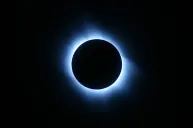Apparently, we are not alone in the universe after all. According to Professor Simon Holland, a NASA filmmaker who has produced numerous documentaries funded by the agency, talked with The Mirror and revealed that evidence regarding the existence of an intelligent alien civilization is about to be made public.
Videos by Wide Open Country
What Holland claims is that the historic announcement should come very soon. Moreover, he says that two different groups of astronomers are currently racing to publish this finding. "We have found a non-human extraterrestrial intelligence in our galaxy, and people don't know about it," said Holland.
Reportedly, Holland got hold of the information from a contact currently working at Mark Zuckerberg's Breakthrough Listen. According to its website, it is the "largest ever scientific research program aimed at finding evidence of civilizations beyond Earth."
"They found the evidence of a non-human technological signature a few years ago, using the Parkes telescope in Australia," said Holland, about what he heard from his contact. However, Holland also mentioned that there is another team located in China that may publish the data first.
"This is breaking news, as of yesterday, but the Chinese might be pipping them to the post, with their, FAST [Five-hundred-meter Aperture Spherical Telescope] program. It's the largest telescope in the world since Arecibo," said Holland. The Chinese invested $180 million in the construction of FAST, which began its testing in 2016. Among its findings, FAST discovered hundreds of pulsars by 2021. They also stated they discovered an alien signal in 2022, but the publication was retracted.
BLC-1, A Wow Signal Indeed, Maybe
The object known as BLC-1, as Holland stated, was picked up by the Parkes radio telescope in 2019. Regarded as the "most promising" technosignature candidate by Holland, astronomers in 2021 provisionally dismissed it as an extraterrestrial signal since it resembled Earth-based signals.
Reportedly, should the signal be confirmed to be true, it comes from a world that orbits Proxima Centauri, the nearest star to Earth after the Sun.
"The signal, instead of being the giant buzz of everything in the universe that we hear through all radio telescopes, was a narrow electromagnetic spectrum," said Holland. Regarding its source, he described it as a single-point source. This could debunk the theory that it comes from Earth itself or that is deep space noise.
Holland remains confident that the announcement will come in the following month or so, coinciding with the U.S. Presidential Election. Whether we are alone in the universe or not will probably be clarified soon, or not at all. Either way, an announcement this big should be made with extreme caution given its potential consequences for humanity.




